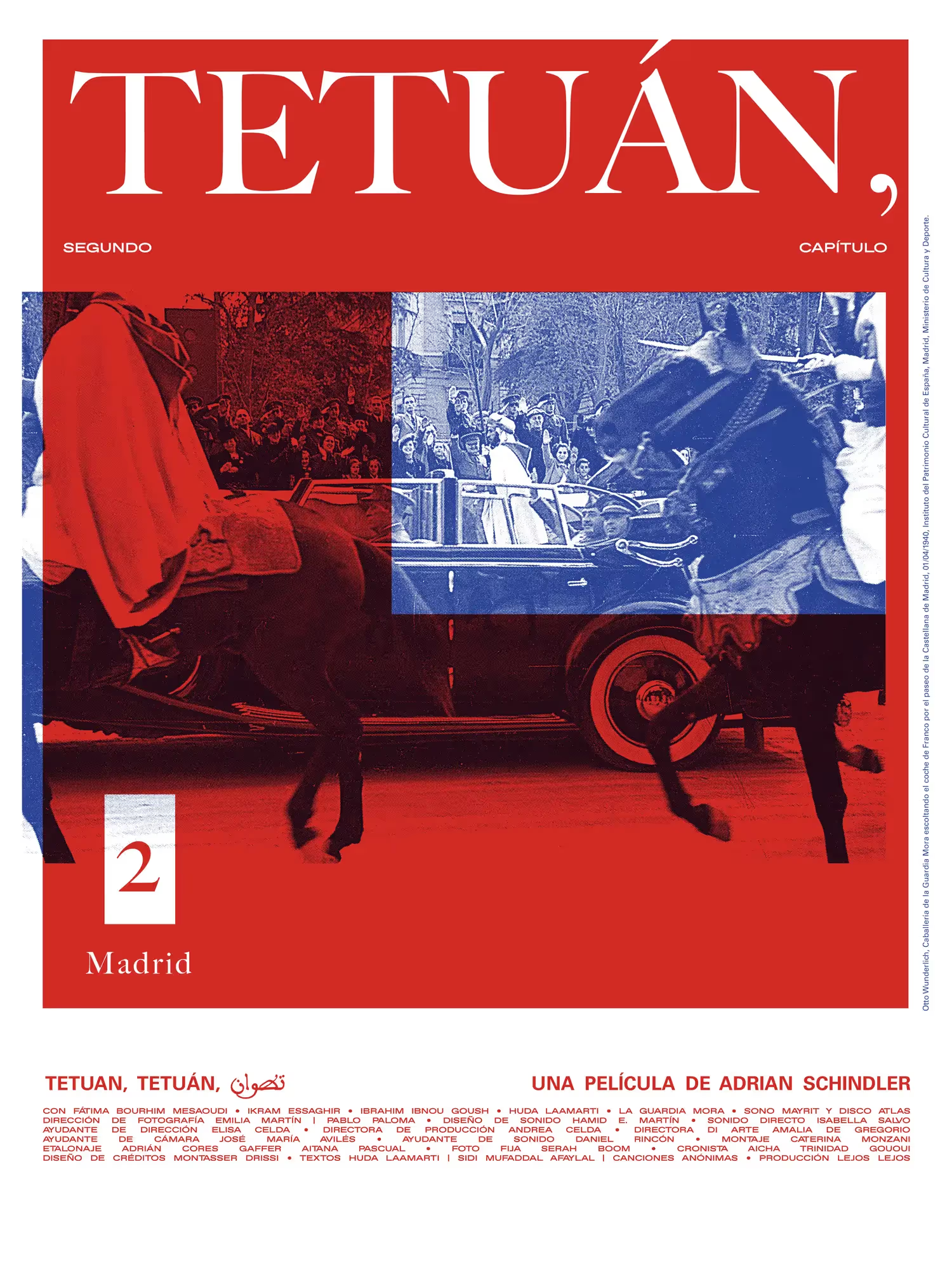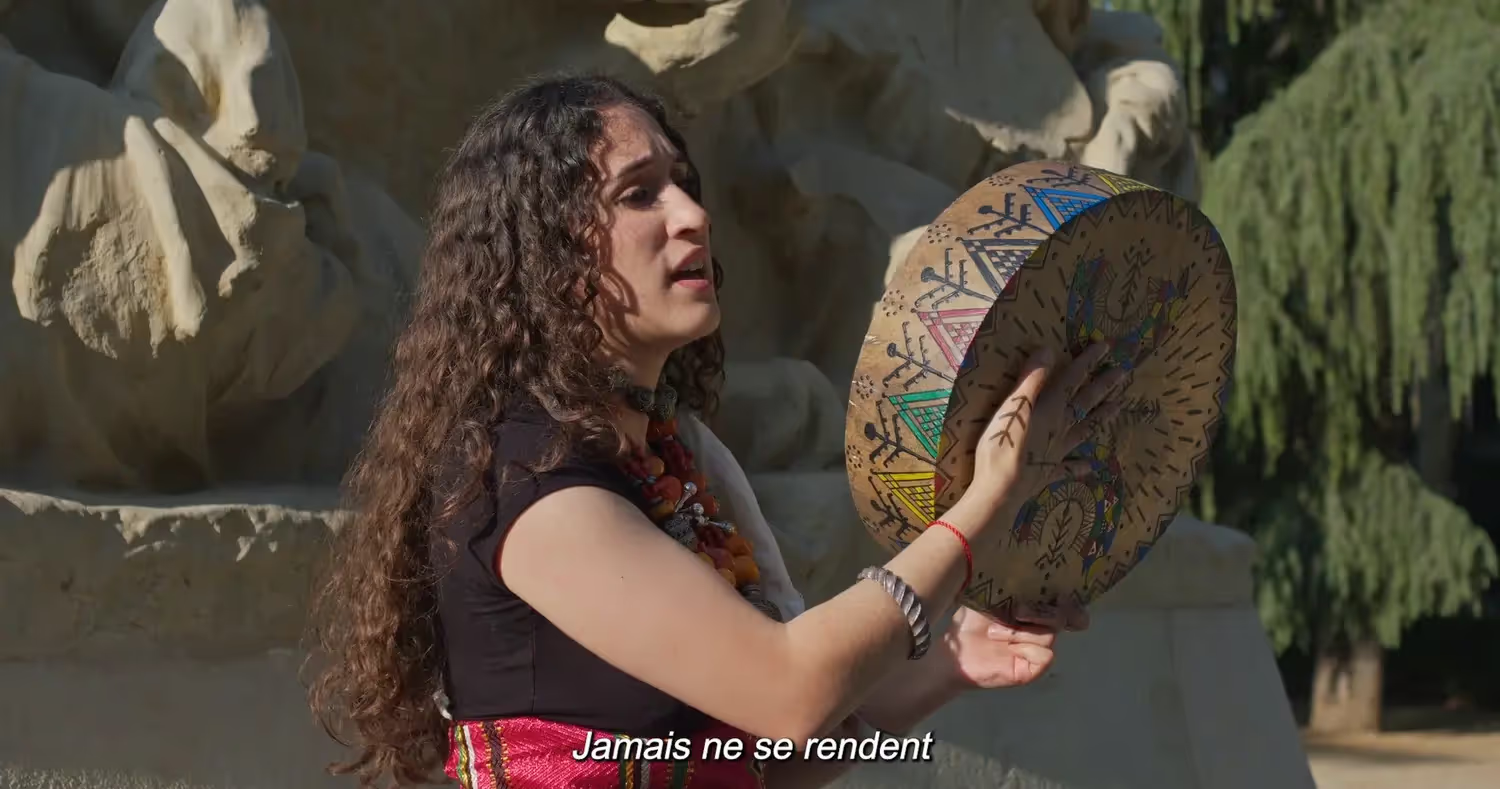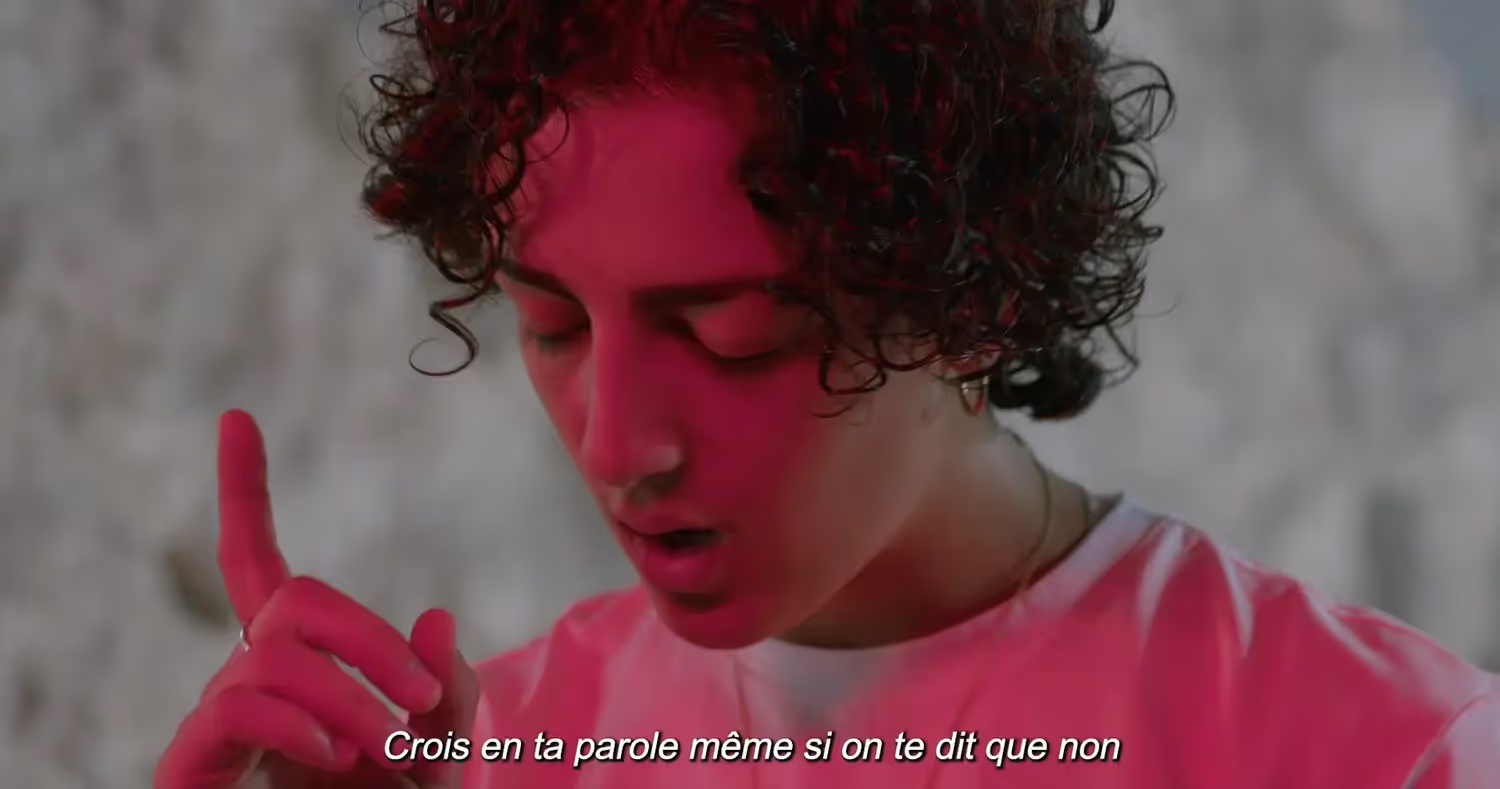







"Tetuan, Tetuán, تطوان" - Evening screening and reading with Adrian Schindler and Aicha Trinidad
The film trilogy "Tetuan, Tetuán, تطوان" examines the Spanish colonial past in Morocco and its impacts on Spanish society through a collaborative approach. Each part, co-developed with Moroccan and Spanish cultural partners, resignifies places such as the Plaça de Tetuan in Barcelona, the Tetuán de las Victorias district in Madrid and the Teatro Cine "Español" in Tétouan. The film screening will be followed by a discussion with researcher Aicha Trinidad Gououi, who was invited as a chronicler during the filming of the second chapter, and who will read a text combining logbook, theoretical reflections and family stories to open the debate on the creative process and the methodological and ethical positions of the two artists.

All dates



"Tetuan, Tetuán, تطوان" - Evening screening and reading with Adrian Schindler and Aicha Trinidad
The film trilogy "Tetuan, Tetuán, تطوان" examines the Spanish colonial past in Morocco and its impacts on Spanish society through a collaborative approach. Each part, co-developed with Moroccan and Spanish cultural partners, resignifies places such as the Plaça de Tetuan in Barcelona, the Tetuán de las Victorias district in Madrid and the Teatro Cine "Español" in Tétouan. The film screening will be followed by a discussion with researcher Aicha Trinidad Gououi, who was invited as a chronicler during the filming of the second chapter, and who will read a text combining logbook, theoretical reflections and family stories to open the debate on the creative process and the methodological and ethical positions of the two artists.
The film trilogy "Tetuan, Tetuán, تطوان" addresses Spanish colonial past in Morocco and the traces it has left in Spanish society, using an experimental collaborative methodology, examining both cultural production and public space as well as the collective imaginary. Developed in three cities in dialogue with Moroccan and Spanish cultural agents, each of the three chapters explores narrative strategies for resignifying places such as Barcelona's Plaça de Tetuan, Madrid's Tetuán de las Victorias district and Tétouan's Teatro Cine "Español".
The first chapter of the trilogy, produced in Barcelona, focuses on the implication of representation in power relations and the persistence of colonial iconography in current audiovisual production. Close to monuments, two actors, a singer and a researcher share their experiences with cinema and television over coffee. An activist wanders through the Orientalist rooms of the Museu Nacional d'Art de Catalunya, questioning the distribution of roles and the mechanisms of film itself. And a hlaiqui gathers the crew on the Plaça de Tetuan and recounts the legendary trajectories of two Moroccan women who confronted the colonists and their vassals, breaking with stereotypes and canonical narratives.
On the last night of shooting the second chapter, a group of female singers, DJs and radio hosts gather at Madrid's Taverne Mozarabe. As Juan and Othmane play old records and cassettes from the Rif region, the protagonists discuss their Moroccan and Amazigh heritage, the role music played in the liberation movements, and their experiences over the previous shooting days. As the film transposes the memory of historical events in northern Morocco to current events in the Spanish capital, we follow Fátima, Huda, Ikram and Ibrahim as they perform in the streets of the Tetuán district, in front of a monument or in an underground parking lot. Punctuated by the Guardia Mora's latest broadcast and moments of laughter and dance in the tavern, their songs, poems and spoken words highlight the city's obscured colonial heritage and celebrate that the time has come for their generation to forge new narratives.
Tetuan, Tetuán, تطوان (Chapter 1)
2K two-channel video, 33 min, 2021
In collaboration with Salma Amzian, Ali el Aziz, Rita El Jebari, Abdel Aziz El Mountassir and Itzea Goikolea-Amiano.
Tetuan, Tetuán, تطوان (Chapter 2)
Single-channel 2K video, 30 min, 2023
In collaboration with Fátima Bourhim, Ikram Essaghir, Huda Laamarti, Ibrahim Ibnou Goush, La Guardia Mora and Sono Mayrit b2b Disco Atlas.


Adrian Schindler Franco-German artist and filmmaker based in Spain since 2014, lives and works between Tangier and Madrid. His practice explores European fascist and colonial legacies, focusing on Nazi Germany and Spanish colonial past in Morocco. Influenced by decolonial theories, he develops a collaborative work ethic, using archives as performative tools to interrogate current power relations. His work takes the form of performances, films, installations and public encounters.
Aicha Josefa Trinidad Gououi
Aicha Josefa Trinidad Gououi is an artist and researcher, doctoral student in Fine Arts at the Complutense University of Madrid. A fine arts graduate with a master's degree in artistic research, she is working on a thesis entitled *Resistencias del saber*, exploring a queer, feminist and anti-colonial dialogue between Spain and Morocco. She questions traditional academic language, highlighting the marginalization of non-Western knowledge. At the same time, she writes short stories, reflecting her critical approach to knowledge production.
Poster Credit: Sofia Fahli
Practical information
Address
Port de Tanger - Face à Bab El Marsa, Tanger, Maroc
Accessibility

Dates and times
Friday, September 27, 8:30 pm to 10:00 pm

Safety

ADDITIONAL INFORMATION
EXPERIENCES On board


Immersive exhibition "Présentes
Created with the exceptional collaboration of the Musée du Louvre, this exhibition highlights female figures in Mediterranean civilization, thanks to the digitization and modeling of part of the Louvre's collections. A two-stage experience: an introductory film to provide context, followed by an immersive experience in a 16-meter-long tunnel covered by 120 m2 of LED screens.
A sound journey through the Mediterranean
An immersive sound experience designed by Ircam, inviting the public to explore the richness and diversity of the Mediterranean through headphones equipped with spatialized sound.
.webp)
© Elisa Von Brockdorff
The artists
Frequently asked questions
Yes, the boat is freely accessible on site. However, you can pre-book your time online on our website.
For reasons of safety and preservation of the boat, high heels and stilettos may not be worn on the boat.
The museum boat is open to all free of charge. To find out on which quay it will be moored, or to pre-book your slot, consult the page dedicated to your town.
Appropriate facilities have been set up on the Festival site for the reception and access of people with reduced mobility. The boat is equipped with a 1m-wide ramp, accessible to people with reduced mobility, but may require the accompaniment of a third party due to its gradient of over 6%. Access to the aft deck and immersive exhibition is possible. However, the upper deck is not accessible. Please inform us in advance of any special accessibility requirements, so that we can make the necessary arrangements.

.webp)

